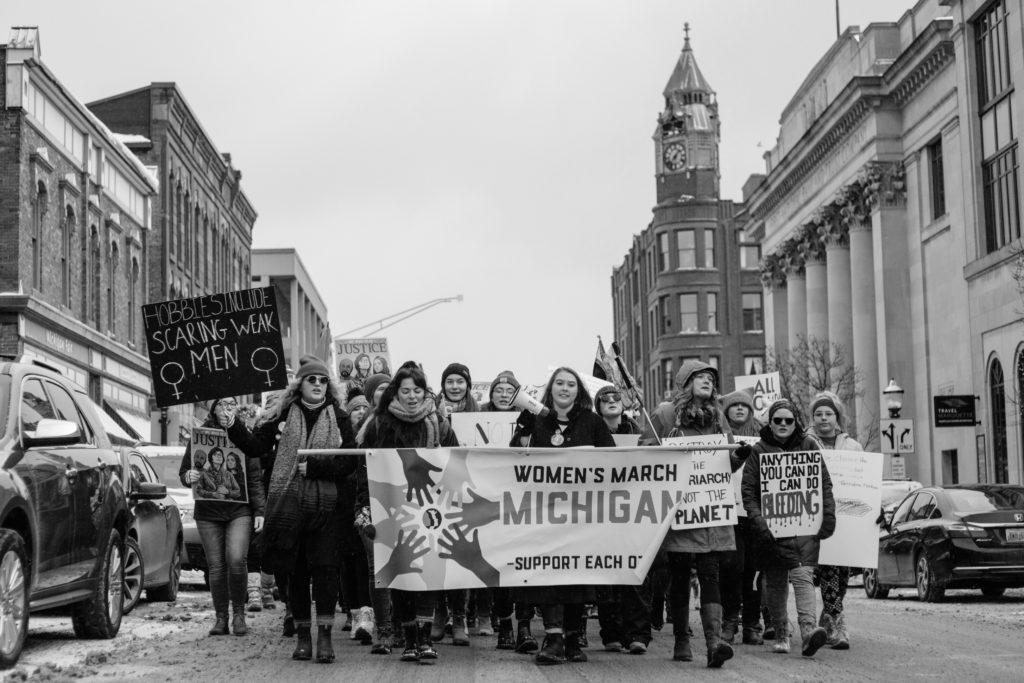Last year, the United States saw a wave of women coming into power. A record number of 127 women were elected to Congress. The #MeToo movement brought forth over 150 women to testify against former U.S. Olympic Gymnastics doctor Larry Nassar, who sexually abused young girls for years. And Saturday’s Women’s March was another mark in the fight for equality with nearly every major city in the country marching for the support and celebration of women’s rights.
Over 1,000 women, men, children and even dogs marched in the third Marquette Women’s March. Marchers gathered at the Marquette Commons for assemblance. Various community groups had informational booths inside the warm walls of the Commons to provide education about women’s resources. Chants and singing could be heard from the crowd outside, preparing to begin the march to the post office one block away. Cars honked their horns in support of the march’s mission and some joined in on the chanting.
The mission of the Women’s March is to harness the political power of diverse women to create transformative change, as stated on the official website,
womensmarch.com
Karlyn Rapport, 83, keynote speaker for the Marquette Women’s March and founder of the Women’s Center, said women’s rights are human rights. Rapport’s weathered, yet strong voice rippled out over the crowd of pink hats on three main issues: equal pay, Betsy DeVos’ Title IX rollback and reproductive freedom.
“Women’s rights go forward a couple of paces and then we’re pushed back,” Rapport said. “I’m trying to point to where we’re making progress and where we need to protect ourselves. I’m thrilled that there are so many women elected to Congress.”
An issue Rapport spoke on was equal pay. The Paycheck Fairness Act, a proposed labor law that would address the gender pay gap in the United States, will be brought before Congress that will prevent discrimination on the basis of gender, she said.
“What people need to understand is that men make 80 cents on the dollar, but if you were a woman of color it would be 60 cents,” Rapport said. “It will be 40 years until we get pay equity, so we have to push forward on this.”
She also spoke on the rollback on Title IX, a federal civil rights law which requires schools to respond to reports of sexual harassment and violence against students. The rollback would essentially make it harder for survivors of sexual violence and harassment to come forward, Rapport said.
“This is a disgrace. It’s making campuses, universities and public schools less safe,” Rapport said. “There’s a public comment period till Jan. 28 at the Department of Education and I’m hoping that they’ll be a flood of letters telling Betsy DeVos that we can’t come back.”
Following Rapport’s speech, she “passed the wave” to two high school students who performed powerful slam poetry that spoke fervently on women’s rights. One of four key coordinators for the march and 1976 NMU graduate Judy Kitchen spoke as well. Kitchen said the march is a celebration of women’s successes and what’s yet to come.
Women like Kitchen and Rapport have long since been the pillars for women’s advocacy in Marquette, senior public relations major Chloe Gerthary said, who was one of the key coordinators for the march.
“The best part has been meeting the women of the community and getting to work with people like Judy Kitchen,” Gerthary said. “These women know Marquette and are pillars of this community. They understand the problems that women face here and the strides that women have made.”
Women’s rights was put on the front burner of Gerthary’s mind with her emerging identity in the LGBTQ comunity. She said coming out was “eye opening” to see those intersections of femininity and queerness,” and has affected the way that she walks through the world.
“It’s really important for me to live in a place that values those intersections of identity and recognizes the steps that need to be taken to bring equity to all those identities,” Gerthary said. “Marquette is one of the only places I’ve lived to make such an effort to reach that equity.”






























